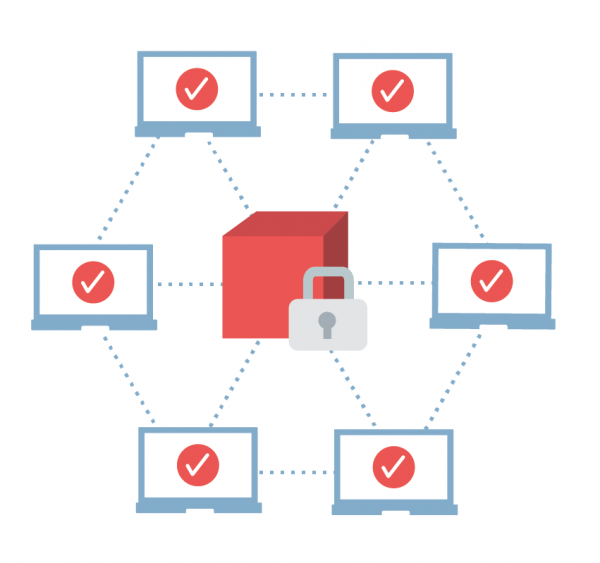Blockchain technology is heralded as the next chapter of the information and network society and is perceived to have an enormous impact on our economy, trade and the public sector. The technology provides a framework for governments to reduce fraud, corruption, error and the cost of paper-intensive processes. We interviewed Marloes Pomp, project leader of thirty blockchain projects within the Dutch government to uncover the potential of this technology for governments and city leaders.
What is the blockchain?
Several years ago the bitcoin made mainstream news. This was mainly due to the rising value of the digital currency. Not many people spoke about the underlying technology, the blockchain and the distributed ledger. But the bitcoin, a virtual currency, is merely the tip of the iceberg. Bitcoin is one of many (potential) applications of the blockchain technology.
What are some of todays applications of the blockchain?
- Renew accreditation systems, for example surrounding Massive Open Online Courses (MOOCS) in South Africa where students from the 'lower' ranked universities are granted access course work from top universities. The same goes for programmes in Dallas and San Francisco where vulnerable groups are assisted in the job market by way of work-learning courses.

- The World Food Program works on a blockchain project which transforms the way in which humanitarian agencies deliver aid. Blockchain is a digital ledger technology used as a trusted way to track the ownership of assets without the need for a central authority, which could speed up transactions while lowering the chance of fraud or data mismanagement. Crucially, its peer-to-peer nature removes the need for verification from costly intermediaries such as banks or other institutions.
How does the blockchain relate to the sharing economy?
To get fair deals in a sharing economy requires some kind of collective representation, altered ownership model, or regulation from the government. A future in which peers are formed into collective bargaining blocs - a little like labor unions, can be envisaged. As well as a future in which peers own the Inc. structure which represents them, or a future in which the government regulates sharing economy companies quite strictly to ensure a fair deal for all. Governments level the playing field between powerful institutions and ordinary people in many areas. The sharing economy may continue to pose challenges which cause governments to pay attention and take action.
When the cost and complexity of running a sharing economy market for cars, housing or some other resource drops by 90% or 95% because of automated contracting infrastructure on blockchains perhaps the natural economic equilibrium will favor many small actors working together in networks rather than larger single corporate bodies. The implication here is that as the Nobel prize winning economist Ronald Coase predicted, as transaction costs drop, flexible markets replace natural monopolies at every scale with a corresponding increase in the baseline efficiency of the whole economy.
A sharing economy deal, organized by one person at a time, might involve five or even eight participants: a buyer, a seller, a cleaner, an insurer, a dispute resolution service, an auditor, a regulator from the government and perhaps additional pre-paid services like tow truck cover for a car rental.
Making these agreements at an individual level is simply too expensive, but in a smart contract environment it could be as simple as sending an email: software ensures that the deals are efficiently set up and reliably executed. So the blockchain has the potential to make the sharing economy more mature.
You have catalysed and curated a number of blockchain pilots in the Netherlands. What are the most interesting results coming out of this?
- Don’t start large blockchain projects at this stage. The technology is still too immature and knowledge within the public administration should be enhanced first. My advise is to start small, invest in developing knowledge, do small projects and experiments to create the first building blocks.
- Establish rules and standards for blockchain code that is created with government funding. This code should be completely open source. Make sure that vendor lock-ins aren’t possible in any form (e.g. service contracts, apps built on top of open source code). This also requires the public service to open-up, to make transparent and honest arrangements with all suppliers.
In 2018, you will be taking the blockchain pilots to the global stage. Why should city, and other governments join and start their own pilots?
Governmental organisations are trying to find answers to the question how to deal with the sharing economy. On the one hand they want to contribute to its promise of a sustainable, social and inclusive economy, while on the other hand they need to reinvent public services in order to continue to safeguard public interest. For both the opportunities and the challenges of the sharing economy, blockchain offers possibilities.
During the sharing economy pilot projects we investigate the opportunities of blockchain available for the new sharing and collaborative economy.
"The blockchain has the potential to redefine the relationship between government and the citizen in terms of data sharing, transparency and trust." - Marloes Pomp

